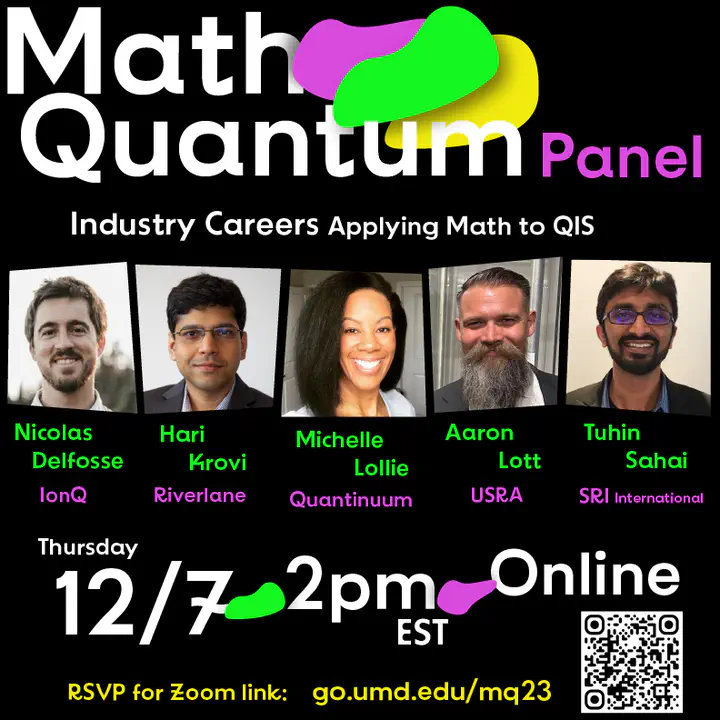Panel - Industry Careers Applying Mathematics to QIS

RSVP here.
This panel will host 5 researchers working in QIS outside of the academic setting to share about their careers, work, and experiences.
Dr. Nicolas Delfosse is a Principal Researcher working on quantum error correction and fault-tolerant quantum computing. After 6 years at Microsoft, he joined IonQ in December 2023 to lead the work on designing the architecture for a fault-tolerant quantum machine. Nicolas obtained a PhD degree in Pure Mathematics from the University of Bordeaux, France, under the supervision of Gilles Zémor. Then, he joined Ecole Polytechnique supported by the LIX-Qualcomm fellowship to work with Alain Couvreur. I held a postdoc position at Sherbrooke University in the group of David Poulin and a postdoc position shared between UCR and Caltech in the groups of Leonid Pryadko and John Preskill.
Dr. Hari Krovi works on various aspects of quantum computing and quantum algorithms. He has a PhD from USC and has worked in Raytheon BBN Technologies for several years before recently joining Riverlane (a quantum start-up). At Raytheon, Hari was the lead on several US grants on quantum computing and quantum communications. At Riverlane, he leads a team working on quantum algorithms and analyzing the effect of noise in quantum hardware. He has several publications including ones in high impact journals such as Nature and PNAS. Many of these are results of collaborations with leading institutions such as MIT, the University of Maryland and the University of Sydney.
Dr. Michelle Lollie is an advanced laser scientist at Quantinuum, supporting the design, development, and construction of complex optical systems foundational to building world class quantum computers. She completed her PhD in Physics at Louisiana State University where her research focused on high-dimensional orbital angular momentum states of light for fiber-based quantum cryptography and communication protocols. She participates in various diversity, equity, inclusion, and accessibility initiatives, advocating for those who are marginalized in STEM fields, particularly in physics. Outside of wrangling photons, you can often find her at home practicing the violin.
Dr. Aaron Lott is a senior interdisciplinary scientist and technical area lead in the Research Institute of Advanced Computer Science at USRA. He is a research staff member of the NASA Ames Quantum Artificial Intelligence Laboratory, and an adjunct associate professor at IPST in UMD College Park where he teaches a masters course in quantum computing algorithms and architectures. Aaron earned his Ph.D. in applied mathematics and scientific computation at UMD College Park, and performed post-doctoral research at the NIST and Lawrence Livermore National Laboratory where he worked on scalable solvers for models of fluid flow. Aaron manages USRA’s portfolio of research in collaboration with around 40 USRA scientists & engineers across emerging sensors, machine learning methods and applications and computing architectures, including groups in nanodevices, core data sciences, environmental data science and quantum computing and space life sciences.
Dr. Tuhin Sahai is a Principal Research Scientist at SRI International broadly interested in the verification, optimization, design, and analysis (VODA) of complex interconnected systems in the presence of uncertainty. His projects have spanned the areas of uncertainty quantification, discrete optimization, and quantum computation. He enjoys working at the interface of multiple disciplines and finding common themes and connections. Prior to joining SRI, Dr. Sahai spent 15 years at Raytheon Technologies Research Center (RTRC) where he held positions of increasing responsibility, culminating in the role of a Technical Fellow. He earned his Ph.D. in January 2008 from Cornell University, where he was a McMullen Fellow and won the H.D. Block teaching award. Dr. Sahai received his Master’s and Bachelor’s in Aerospace Engineering from the Indian Institute of Technology, Bombay in 2002.
Organizers
- Mary Kearney
- Jade LeSchack
- Daniel Serrano
- Dhruv Srinivasan
- Konstantina Trivisa
- Anil Zenginoglu